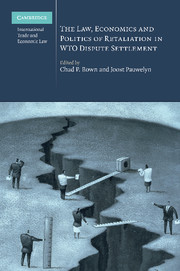Book contents
- Frontmatter
- Contents
- List of tables and figures
- Contributors
- Introduction: trade retaliation in WTO dispute settlement: a multi-disciplinary analysis
- PART I Background and goal(s) of WTO retaliation
- PART II A legal assessment after ten arbitration disputes
- PART III An economic assessment after ten arbitration disputes
- PART IV The domestic politics and procedures for implementing trade retaliation
- PART V Problems and options for reform
- 15 Evaluating the criticism that WTO retaliation rules undermine the utility of WTO dispute settlement for developing countries
- 16 Optimal sanctions in the WTO: the case for decoupling (and the uneasy case for the status quo)
- 17 Sanctions in the WTO: problems and solutions
- 18 WTO retaliatory measures: the case for multilateral regulation of the domestic decision-making process
- 19 The WTO Secretariat and the role of economics in panels and arbitrations
- 20 The equivalence standard under Article 22.4 of the DSU: a ‘tariffic’ misunderstanding?
- PART VI New frontiers and lessons from other fields
- Index
15 - Evaluating the criticism that WTO retaliation rules undermine the utility of WTO dispute settlement for developing countries
Published online by Cambridge University Press: 26 February 2010
- Frontmatter
- Contents
- List of tables and figures
- Contributors
- Introduction: trade retaliation in WTO dispute settlement: a multi-disciplinary analysis
- PART I Background and goal(s) of WTO retaliation
- PART II A legal assessment after ten arbitration disputes
- PART III An economic assessment after ten arbitration disputes
- PART IV The domestic politics and procedures for implementing trade retaliation
- PART V Problems and options for reform
- 15 Evaluating the criticism that WTO retaliation rules undermine the utility of WTO dispute settlement for developing countries
- 16 Optimal sanctions in the WTO: the case for decoupling (and the uneasy case for the status quo)
- 17 Sanctions in the WTO: problems and solutions
- 18 WTO retaliatory measures: the case for multilateral regulation of the domestic decision-making process
- 19 The WTO Secretariat and the role of economics in panels and arbitrations
- 20 The equivalence standard under Article 22.4 of the DSU: a ‘tariffic’ misunderstanding?
- PART VI New frontiers and lessons from other fields
- Index
Summary
Introduction
It has often been observed that a fundamental disadvantage of the WTO dispute settlement system for developing countries is the inability of many of them to enforce positive rulings against larger WTO members. When there is an asymmetry in the market size of the developing country and the non-complying WTO member, the WTO's enforcement measures have been characterised as ‘virtually meaningless’.
The WTO legal system envisages a right of retaliation through the suspension of trade concessions or obligations as well as countermeasures. The criticism of these retaliation rules, from a developing-country perspective, is that developing countries with small domestic markets are not able to impose sufficient economic or political losses within the larger WTO members to generate the requisite pressure in order to induce compliance. In fact, the suspension of trade concessions may be more detrimental to the developing country than the non-complying member. Consequently, there is a common perception that shortcomings in the WTO retaliation rules undermine the utility of WTO dispute settlement for developing countries.
This chapter critically evaluates this widely held criticism of the WTO retaliation rules. It observes that while legal and economic theory illustrates the potential shortcomings of WTO retaliation for developing countries, GATT and WTO dispute settlement practice demonstrates high rates of compliance with dispute settlement rulings. Thus, the chapter queries whether the ability to retaliate effectively is a key determinant for WTO members complying with dispute settlement rulings.
- Type
- Chapter
- Information
- Publisher: Cambridge University PressPrint publication year: 2010



